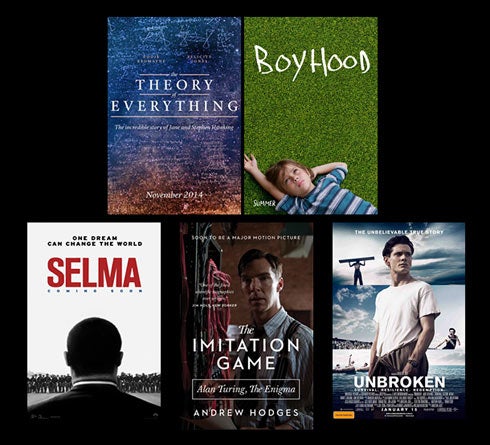
Hollywood is being rocked by the shockwaves of the illegal and dangerous cyber-attack on Sony Pictures. The tremendous focus on this attack wrapped up Hollywood in questions of geopolitics, businesses, and society in the digital age. In the media zeal to cover the issue we should not forget the ability to create and distribute entertainment product is one of America’s most powerful cultural and economic engines.
Normally art, particularly movies, rises above the fray of international affairs and global espionage. What Hollywood does so well is to create a narrative which inspires the viewers to tell powerful stories, entertain, educate and motivate. This holiday season, let us remember that movies are a reflection of courage, heroism, tenacity, and humanity that we all share.
Among the dozens of diverse, interesting and important theatrical and documentary movies produced and distributed this year include five important stories demonstrating the power of the film medium to portray acts of personal courage and deep humanity.
- “Unbroken” is a story of the unbelievable courage and strength of Louis Zamperini, an Olympic runner and middle class Italian American kid, who defied all odds after his plane crashed in the Pacific during action in the Second World War. He survived nearly two years under brutal treatment of the as a prisoner of war and his story is a marvel of our ability to endure in the face of extreme hardship.
- “The Imitation Game” is a story of a brilliant but socially awkward British mathematician named Alan Turing. He created the world’s first computer (which he fondly called Christopher) and it solved the previously un-breakable Nazi Enigma encryption program which significantly shortened the Second World War and saved tens if not hundreds of thousands of lives. Beyond his technological achievement the movie demonstrates the destructive impact of that era’s British attitudes towards homosexuality and shows how far the Western world has come in terms of accepting gay and lesbian people and ensuring that their rights are protected.
- “The Theory of Everything” tells of the theoretical physicist Steven Hawking, who defied a near-certain death sentence from a motor neuron disease and went on to become one of the greatest theorists and physicists in world history. His work and books changed human understanding of foundational theories of the way our universe functions. That he was able to make such an astounding contribution to quantum physics while his body was profoundly disabled is a miracle science would struggle to explain.
- “Boyhood” is one of the most unique movies I have ever seen. This feature film depicts an American family as it grows and develops for over a decade. Using the same actors one can actually see a family change over time, face new challenges and adapt to difficult circumstances. Richard Linklater has created a masterpiece, demonstrating a kind of unique creativity that is the hallmark of American movies.
- “Selma” is the story of Dr. Martin Luther King’s quest to bring equality and true civil rights, in particular voting rights, to African Americans. This nation has a fraught history with race as evidenced by recent events related to the deaths of Michael Brown, Eric Garner and the two New York police officers who lost their lives in the line of duty. Selma is brilliantly acted and does a fantastic job showing how far we as a society have come in race relations and how much further we have yet to go.
These five movies are examples of the incredible diversity, size and scope of the film product and the audiences that see them, and it is a good time to reflect how much joy this industry gives to the people of the world. Shakespeare once said that, “the play is the thing.” In the case of movies the story is the thing. Even the most nefarious acts of theft and terror cannot take away the power of American film to reflect upon great creativity and great lives, and to inspire and motivate people in the process.
Dan Glickman is the former Chairman of the Motion Picture Association of America. He is currently Vice President of the Aspen Institute.
